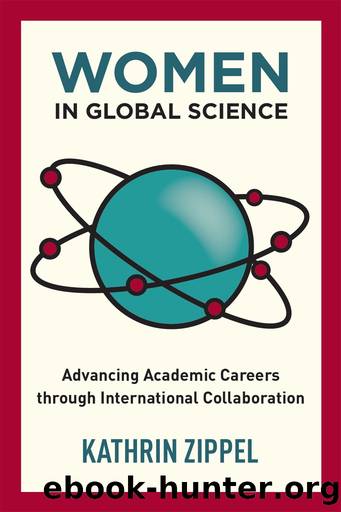Women in Global Science by Kathrin Zippel

Author:Kathrin Zippel [Zippel, Kathrin]
Language: eng
Format: epub
Tags: Social Science, Gender Studies
ISBN: 9781503601505
Google: 0se9DQAAQBAJ
Publisher: Stanford University Press
Published: 2017-03-21T05:26:54+00:00
5
Families and International Mobility
Fences or Opportunities?
ASKED WHAT SUGGESTIONS SHE WOULD GIVE OTHER WOMEN academics who wanted to do research abroad, Jenna, a full professor of biological science, advised travel first, then kids: âI would definitely encourage women to do it. Do it before you have kids! Get it started at least, because it is hard.â Jennaâs perspective is widespread. Although many changes have occurred for women in academia, faculty, university administrators, and policy makers still share the assumption that family commitments limit womenâs international academic mobility. Isabella, an associate professor of biology, explained her decision to stay local while on leave: âI could have gone to Europe; I could have gone to Africa and researched the animals that I wanted . . . But thatâs not going to happen. I am married, and I am going to have a family. I did not get married to leave him alone and go to Africa.â Similarly, Rafaelle, an administrator, shared her view of the realities of international travel by contrasting two women faculty members: Jane, who has children and has not been involved in international collaborations, and Susan, who does not have children and has extensive international contacts and travels abroad for research every summer.
In this chapter, I look more closely at the assumption that family responsibilities create barriers for women academics, preventing them from engaging in international research and collaborations. Although the literature provides mixed evidence that marriages, relationships, and children, in particular, hamper womenâs international scientific involvement, many interviewees expressed this view. Their actual experiences, in fact, painted a more complicated and notably shifting picture. For academics today, family and its responsibilities mean much more than women and children: Men also make decisions on the basis of their children, parents can be another care responsibility or an invaluable support, and gay and lesbian families have their own legal and practical issues, to name just a few. The ramifications of this extended definition of family bring both challenges and opportunities. Traveling abroad can magnify workâfamily conflicts, in what I call the âamplification of family burdens.â At the same time, international research opportunities can bring exciting family opportunities, depending on the research sites.
Academics live in diverse family constellations and have local commitments that shape their mobility; when it comes to working abroad, these can be potentially constraining but also motivating. Many faculty members with family responsibilities are mobile and engaged in international collaborations, and family as well as institutional support can be crucial to their efforts. Ultimately, then, families in all their permutations prove to be not permanent barriers but fences: With effort, academics do surmount them to their professional and personal benefit. Yet women still bear more of a burden for family responsibilities than menâand, perhaps even more important, feel more of a burden. Those fences do, on the whole, remain higher for women, a fact that has important policy implications.
Do Children Prevent Women from Going Abroad?
I think for a short time you can work it out. If you go away for a long time, probably you can work it out.
Download
This site does not store any files on its server. We only index and link to content provided by other sites. Please contact the content providers to delete copyright contents if any and email us, we'll remove relevant links or contents immediately.
| Anthropology | Archaeology |
| Philosophy | Politics & Government |
| Social Sciences | Sociology |
| Women's Studies |
Born to Run: by Christopher McDougall(7127)
The Leavers by Lisa Ko(6948)
iGen by Jean M. Twenge(5416)
Sapiens by Yuval Noah Harari(5372)
Spare by Prince Harry The Duke of Sussex(5197)
The Kite Runner by Khaled Hosseini(5180)
Machine Learning at Scale with H2O by Gregory Keys | David Whiting(4313)
Bullshit Jobs by David Graeber(4192)
Never by Ken Follett(3957)
Goodbye Paradise(3810)
Livewired by David Eagleman(3775)
Fairy Tale by Stephen King(3399)
A Dictionary of Sociology by Unknown(3085)
Harry Potter 4 - Harry Potter and The Goblet of Fire by J.K.Rowling(3074)
The Social Psychology of Inequality by Unknown(3031)
The Club by A.L. Brooks(2926)
Will by Will Smith(2920)
0041152001443424520 .pdf by Unknown(2846)
People of the Earth: An Introduction to World Prehistory by Dr. Brian Fagan & Nadia Durrani(2739)
